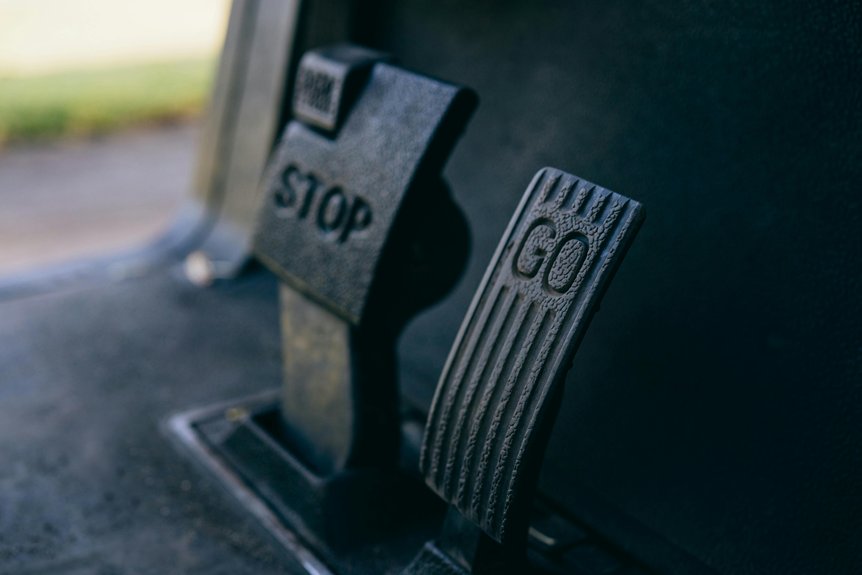If your transmission starts to whine while you’re driving, it could be a sign of several underlying issues. From low fluid levels to worn internal parts, these noises often point to problems needing attention. Identifying the cause early can save you from costly repairs later. Curious about what might be causing that persistent hum? Let’s explore the common reasons behind a whining transmission and how to address them.
Causes Related to Low Transmission Fluid Levels
A common cause of transmission whining while driving is low transmission fluid levels. When your fluid is low, it can cause the transmission to work harder, resulting in that whining noise. Transmission fluid leaks are often the culprit, gradually decreasing the fluid level over time. To address this, perform a fluid level check regularly, especially if you notice increased noise or shifting issues. If you find the fluid is low, inspect for leaks underneath your vehicle or around the transmission area. Maintaining proper fluid levels keeps the transmission lubricated and functioning smoothly, preventing the whining caused by insufficient fluid. Regular transmission maintenance can help identify and prevent fluid level issues before they lead to more serious problems.
Worn or Damaged Transmission Components
Worn or damaged transmission components can also cause whining noises while you’re driving.
If your clutch has excessive wear, it may struggle to disengage properly, leading to noise and vibration.
Gear misalignment, often caused by worn bearings or damaged gears, can create friction and produce whining sounds as the transmission struggles to operate smoothly.
These issues disrupt the normal gear engagement and can cause metal-on-metal contact, amplifying noise.
If you notice persistent whining, it’s a sign that internal components are compromised.
Addressing worn or damaged parts early can prevent further damage and costly repairs down the line.
Issues With Transmission Pump or Bearing Noise
When the transmission pump or bearings develop issues, they often produce a distinctive whining noise while you’re driving. This noise can sometimes be mistaken for external noise sources, but if it persists, it signals a problem.
You might notice transmission fluid leaks near the transmission, which reduce lubrication and cause the pump or bearings to struggle. As these components wear or become damaged, they create a high-pitched whine that worsens with speed.
Addressing these issues early prevents further damage. Keep an ear out for unusual noises, and if you detect a whining sound combined with fluid leaks, have your transmission inspected promptly.
Problems With Transmission Solenoids and Valves
Problems with transmission solenoids and valves can cause a noticeable whining or humming noise while you’re driving, especially if they malfunction. When these components fail, they may lead to transmission fluid leaks, reducing fluid levels and causing poor shifting or slipping.
Sensor malfunctions within the solenoid system can send incorrect signals, disrupting the flow of transmission fluid and creating noise. You might also notice delayed gear engagement or erratic shifting.
These issues often result from worn or damaged solenoids and valves, which can’t properly regulate pressure and fluid flow. Addressing these problems promptly helps prevent further damage and keeps your transmission running smoothly.
External Factors and Driving Conditions
External factors and driving conditions can substantially influence the presence of transmission whining while you’re on the road. Rough or uneven road surfaces increase vibrations, which can amplify whining sounds from your transmission.
Similarly, weather conditions play a role; extreme heat may cause fluid thinning, leading to increased noise, while cold weather thickens fluid, possibly worsening whine.
Wet or icy conditions can also affect how smoothly your transmission operates, making whines more noticeable.
Being aware of these external factors helps you understand that some transmission noise mightn’t indicate a serious problem but rather a response to the driving environment.
Conclusion
If your transmission whines while driving, it’s often a sign of low fluid levels, worn internal parts, or issues with the pump or solenoids. External factors, such as road conditions or debris, can also amplify the noise but don’t always indicate internal damage. Regular maintenance and inspections are essential to identify these problems early. Addressing the cause promptly can prevent costly repairs and ensure your vehicle runs smoothly. If you notice any unusual sounds, don’t hesitate to get your transmission checked. To schedule your free TransScan or to book an appointment, call us today at (919) 471-2506 or visit us online at Durham Transmission.

